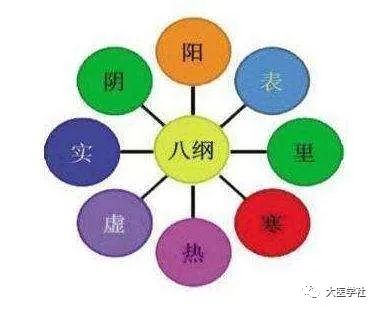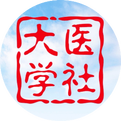

The Eight Principles Differentiation (Ba Gang Bian Zheng) is the general framework for various differentiation methods in Traditional Chinese Medicine (TCM).
The process of differentiation is based on theories of the organs (zang fu), meridians (jing luo), qi (vital energy), blood (xue), body fluids (jin ye), and disease etiology. It involves the comprehensive collection, induction, analysis, reasoning, and judgment of symptoms and signs gathered through the four diagnostic methods: observation (wang), listening and smelling (wen), inquiry (wen), and palpation (qie), to understand the disease and make an accurate diagnosis.
Differentiation and treatment are two crucial interrelated aspects of TCM’s principles, methods, formulas, and medicines in clinical practice. Differentiation is the understanding of the disease, while treatment refers to the corresponding therapeutic measures and methods taken for the diagnosed condition. Differentiation serves as the premise and basis for treatment, while treatment is the objective and an objective standard for verifying the correctness of differentiation.
“Symptom” (zheng) refers to an individual symptom, which is recognized similarly in both TCM and Western medicine, such as headache, fever, cough, palpitations, nausea, etc.
“Disease” (bing) refers to the name of the disease. In TCM, only a few disease names correspond with those in Western medicine, such as measles, diphtheria, tetanus, asthma, dysentery, and heat stroke, while most terms differ. Due to the different theoretical systems of TCM and Western medicine, the understanding of diseases varies. Western medicine’s understanding is based on human anatomy and pathophysiology, with clinical diagnosis relying on the patient’s subjective symptoms, physical examination, and laboratory tests. TCM, however, views diseases as results of imbalances in yin and yang, with clinical differentiation primarily based on the patient’s symptoms and signs (such as tongue and pulse diagnosis). Diagnosis does not necessarily require determining the disease name but rather clarifying the specific “pattern” (zheng).
“Pattern” (zheng) is an abbreviation for evidence and syndrome. It is not merely a symptom or subjective feeling but a group of syndromes, representing TCM’s diagnostic approach to diseases. A “pattern” encompasses a specific set of clinical manifestations (symptoms, signs, etc.) and includes a comprehensive concept involving etiology, location of the disease, nature of the disease, and the comparative strength of the body’s righteous and evil forces. The “pattern” is derived from analyzing symptoms and signs, summarizing them into a concept that better explains the essence of the disease.
TCM differentiation has developed through long-term clinical practice, employing various methods, primarily including Eight Principles Differentiation, etiology differentiation, qi and blood differentiation, organ differentiation, defensive qi, nutritive qi, and blood differentiation, and San Jiao differentiation, among others. The Eight Principles Differentiation serves as the general framework for all differentiation methods.
The Eight Principles Differentiation is based on the materials obtained from the four diagnostic methods, conducting a comprehensive analysis to explore the nature of the disease, the location of the pathological changes, the severity of the disease, the strength of the body’s response, and the comparative strength of the righteous and evil forces. It categorizes conditions into eight types: yin, yang, exterior, interior, cold, heat, deficiency, and excess. This is a fundamental method of differentiation in TCM, encompassing the general principles of various differentiation methods while also summarizing the commonalities from the individual characteristics of these methods. It plays a crucial role in simplifying complex disease presentations and highlighting the key aspects during the diagnostic process.
Although the manifestations of diseases are extremely complex, they can generally be categorized within the Eight Principles. The overall categories of diseases include yin patterns and yang patterns; the depth of the disease can be classified as exterior or interior; imbalances in yin and yang, with yang excess or yin deficiency leading to heat patterns, and yang deficiency or yin excess leading to cold patterns; the strength of the evil and righteous forces, with strong evil qi termed excess patterns and weak righteous qi termed deficiency patterns. Therefore, the Eight Principles Differentiation analyzes the myriad changes in diseases according to the simple dichotomies of exterior and interior, cold and heat, deficiency and excess, yin and yang, revealing the contradictions within the pathological changes, thus capturing the essence of whether the condition is exterior or interior, cold or heat, deficiency or excess, and belongs to yin or yang. This embodies the fundamental spirit of the Eight Principles.
Click the titles below to listen and learn
Episode 1: Exterior Patterns - I will teach you how to diagnose
Episode 2: Interior Patterns - The uninvited guest has entered the door
Episode 3: Half Exterior Half Interior Patterns - A condition with one foot inside and one foot outside
Episode 4: Cold Patterns - Fear of cold, retraction of hands and feet are typical manifestations of cold patterns
Episode 5: Heat Patterns - Why are flushed faces and yellow tongue coating related to heat patterns?
Episode 6: Deficiency Patterns - What exactly should we differentiate in deficiency and excess?
Episode 7: Excess Patterns - Is the excess pattern due to excessive righteous qi or rampant evil qi?
Episode 8: Yin and Yang Differentiation - Without understanding yin and yang, one cannot diagnose properly!
Click the titles below to listen and learn
Episode 1: Exterior Patterns - I will teach you how to diagnose
Episode 2: Interior Patterns - The uninvited guest has entered the door
Episode 3: Half Exterior Half Interior Patterns - A condition with one foot inside and one foot outside
Episode 4: Cold Patterns - Fear of cold, retraction of hands and feet are typical manifestations of cold patterns
Episode 5: Heat Patterns - Why are flushed faces and yellow tongue coating related to heat patterns?
Episode 6: Deficiency Patterns - What exactly should we differentiate in deficiency and excess?
Episode 7: Excess Patterns - Is the excess pattern due to excessive righteous qi or rampant evil qi?
Episode 8: Yin and Yang Differentiation - Without understanding yin and yang, one cannot diagnose properly!

Previous Highlights Click the titles below to view detailed content!
★ Cupping caused a patient to suffer a level 9 disability! The clinic compensated 130,000, everyone should be vigilant
★ TCM: The 9 most harmful habits to the body that must be quit!
★ Did grandma’s guasha cause a 10-month-old baby to have facial ulcers? TCM reminds: Guasha must be differentiated, do not scrape randomly!
★ As the winter solstice approaches, do not do these 5 things! Follow these tips for a smooth winter
★ The world’s oldest person has passed away! He shared longevity secrets that are simple enough for everyone to replicate!
★ A family of four all suffering from leukemia, this dish that everyone loves to eat in winter has formaldehyde exceeding 400 times!
★ Observe the lips to know health
★ This is the true “ancient TCM tongue diagnosis” (preserve for in-depth reading)
★ 5 oranges sent him to the ICU! Doctors: This group of people must eat fewer oranges!
★ 24 hand diagnosis images, comparable to X-rays, reveal your physical and mental health
★ Cupping caused a patient to suffer a level 9 disability! The clinic compensated 130,000, everyone should be vigilant
★ TCM: The 9 most harmful habits to the body that must be quit!
★ TCM is amazing, this movie must be watched
★ The new winter health preservation chart is out! To avoid getting sick, do these things…
★ The world’s oldest person has passed away! He shared longevity secrets that are simple enough for everyone to replicate!
★ A family of four all suffering from leukemia, this dish that everyone loves to eat in winter has formaldehyde exceeding 400 times!
★ The modern person ruined by “heavy flavors” ends up with a body full of diseases!
★ Nearly 3 cm fishbone stuck in the throat! His method should be shared with everyone~
★ Why are many cancers diagnosed at late stages? Many early signals are ignored!
★ The two dirtiest dishes in restaurants, smart people never order, restaurant owners: I wouldn’t dare eat them myself!
★ In winter, eat radishes and ginger; two warming soups to keep the body warm
★ Why are there more and more patients? Doctors boldly stated the harsh truth
★ Today’s heavy snow | Health preservation focuses on “hiding”, do these four things well~
★ A middle-aged man suddenly died during “intimacy”! It was all because he did this beforehand!
★ Three cups of water to drink in winter! One for moistening the intestines, one for kidney protection, and one to prevent stroke!
★ Shocking! This type of fish you often eat is a “Class 1 carcinogen”, only found out after eating it for so many years……
★ In winter, add “it” to your soup, nourish the five organs and strengthen the body! But different groups should pay attention when drinking soup…


